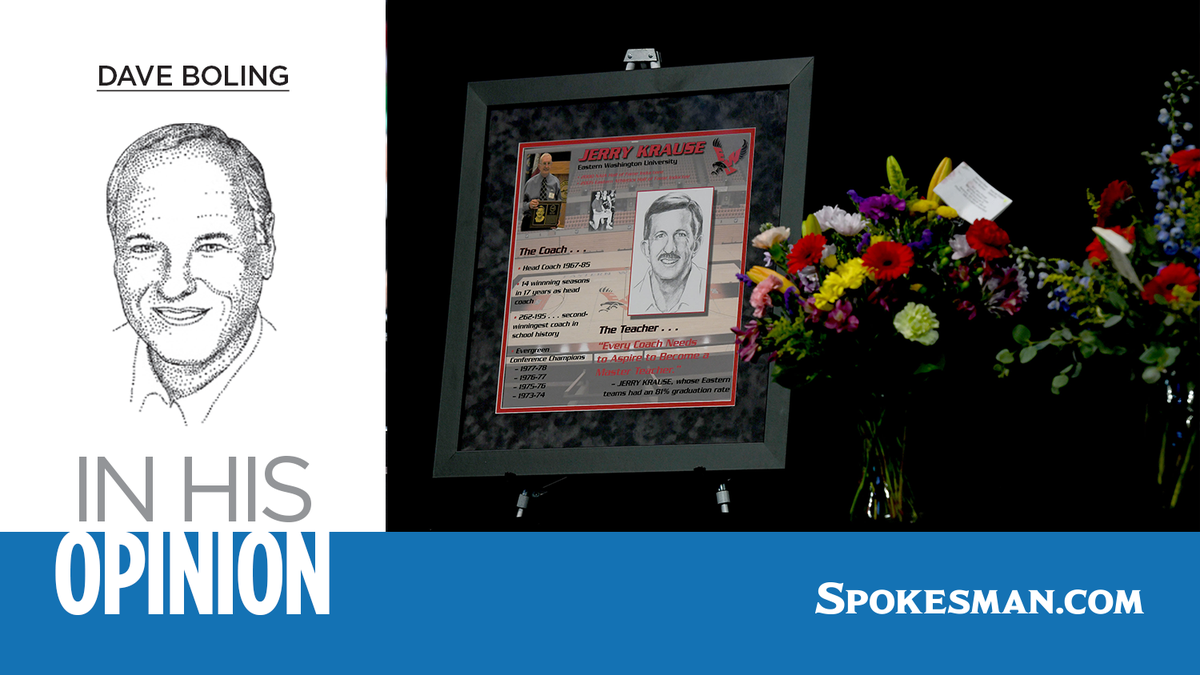Dave Boling: Dr. Jerry Krause remembered for how he lived his life as much as his impact on the game of basketball

Entire religions are based on theories of how one should live a good life.
Maybe such things are most easily decoded looking backward, observing a well-lived life and seeing how a person accomplished such a monumental thing.
In the case of Dr. Jerry Krause, it all seemed a matter of finding a passion and devoting his life to it – and if it’s in the service of others, as was his life, all the better.
And if a person can positively impact thousands of students and athletes and fellow basketball coaches, then perhaps people will offer the kind of tearful tributes that were dedicated to Krause Wednesday at a “Celebration of Life” for him at Gonzaga University’s McCarthey Athletic Center.
Krause died May 25 at age 87, after coaching basketball, administrating and teaching for decades at Eastern Washington University and Gonzaga.
His career earned him induction into the National Collegiate Basketball Hall of Fame last November. Among a lengthy list of accolades, perhaps the most appropriate came in 2003 when the National Association of Basketball Coaches cited him as a “Guardian of the Game.”
Being a great coach over a long career is one thing, but being considered a Guardian of the Game is another level entirely, bestowing upon Krause almost a superhero aura. All so completely deserved as Krause spent decades on the basketball coaches’ research committee, while also being an early innovator and promoter of the use of basketball analytics.
An old-school coach open to new-age concepts, Krause cranked out more than 60 books and videos on coaching and fundamentals, and was conducting clinics as recently as this March.
The description of the man during the tribute were straight from an Eagle Scout handbook.
Integrity. Honesty. Dedication. Character – no, more than that, make that “unassailable character.” Professionalism. Personal courage. A man with zero ego.
Lisa Fortier, Gonzaga’s head women’s basketball coach, grew particularly close to Krause as he volunteered with the Zags for nine recent seasons. Krause stressed to her that “teaching and coaching are synonymous,” and “it’s not what you teach, but what they learn.”
Another coaching axiom Krause used to unleash on former GU assistant Tommy Lloyd, now head coach at Arizona: “They don’t care how much you know until they know how much you care.”
“For coach, it was all about relationships and mentoring,” Lloyd said.
Krause was more than just the resident sage spouting aphorisms, connecting at a much deeper, personal level with many colleagues.
“Coach was the closest thing I ever had to a grandpa in my life,” Lloyd said, pausing for long moments to control his emotions, then saying that Krause lived a life of “kindness, selflessness and gratitude.”
Lloyd touched briefly on what he had learned about the great privation Krause suffered as a youth. It triggered some archive research that produced a more detailed account of his background that Krause rarely shared. This came from a moving column by Dan Weaver for the Spokane Daily Chronicle in February 1985, shortly after Krause was fired from EWU after 18 seasons of shepherding the Eagles on a precipitous rise from the NAIA level to NCAA Division I.
Addressing the fact that some suggested that getting fired was “a tough time,” Krause gave a perspective that, in a larger sense, revealed how he became such a determined and disciplined coach and educator.
“I think back to my father, a Midwestern farmer in the Depression years of the 1930s and the Dust Bowl,” Krause told Weaver. “He had four kids, 160 acres, a pregnant wife and no money. And when I was born, he lost his wife. I think back five years later, my dad had five kids still trying to survive. He had remarried and provided us a mother. And then one day, he couldn’t face another day. He went out to the barn that night and hung himself.
“Those,” he stressed, “are tough times.”
So, getting fired didn’t slow Krause, only redirected his energies. For more than 35 years afterward he continued influencing and instructing players and coaches around the country.
His determination, even in the face of an ominous cancer diagnosis, was typical of Krause.
Craig Fortier, husband of Lisa and assistant women’s coach at GU, said Krause had a terse, two-word answer when he was asked what was next for Krause: “Radical recovery!”
Several of his doctors were less optimistic than Krause, Craig Fortier said, and Krause fired them.
There haven’t been many tears shed in the Kennel over the past few decades, as the Zags rarely suffer defeat there. But memories of coach Jerry Krause were an emotional loss his admirers at the arena won’t soon forget.